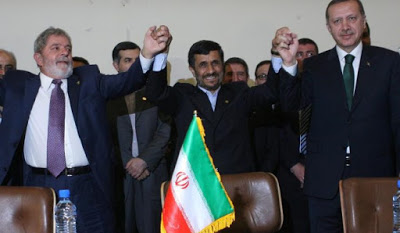Inside story of the first Iran nuclear deal Interview with Lula, Part III
 |
| Pepe Escobar 09/09/2019 |
Lula on fights with Hillary, talks with Ahmadinejad, Obama ‘good but nervous and too young’
As we advanced past the first hour of a historic interview – see here and here – at a Federal Police building in Curitiba, southern Brazil, where Lula has been incarcerated for over 500 days as part of the lawfare endgame in a complex coup, former president Luiz Inacio Lula da Silva was on a roll.
“Let me tell you about Iran.”
He felt relaxed enough to start telling stories of political negotiation at the highest level. He had already set the context. Nuggets abounded – especially focusing on the sometimes rocky relationship between Brasilia and Washington. Here are only three examples:
1) On the overall relationship with the US: “People think that I’m angry at the Americans. On the contrary, we had a very healthy political relationship with the US, and that should be the case for Brazil. But to be subservient, never.”
Fights with Hillary
2) On dealing with George W. Bush, Barack Obama and Hillary Clinton: “Bush accepted ideas with more fluidity than Obama. Obama was much tougher with Brazil. I’m certain that Hillary Clinton does not like Latin America, and she didn’t like Brazil. I had two big fights with her, one in a meeting in Trinidad-Tobago and another in Copenhagen [at the climate conference COP-15]. She arrived late, bossing everyone around. I said, ‘Lady, hang on. Wait for your turn. I’ve been here for three days.’ The petulance and arrogance of the Americans disturbs me, even if I think that the United States is always an important nation, and we should always maintain a good relationship.”
3) On hybrid war: “We tried to organize intelligence in the Air Force, the Navy, along with Federal Police intel, but among them there were some pretty serious fights. Whoever has intel has power, so no one wants to relay information to the competitor…. I imagined that after it was clear [from Edward Snowden’s revelations about National Security Agency surveillance] that … the United States was investigating Brazil … I imagined we would have a tougher position, maybe talking to the Russians and the Chinese, to create another system of protection. Our main political gesture was Dilma [Rousseff, then the Brazilian president] traveling to the US, but Obama, it seems to me, had very little influence.


